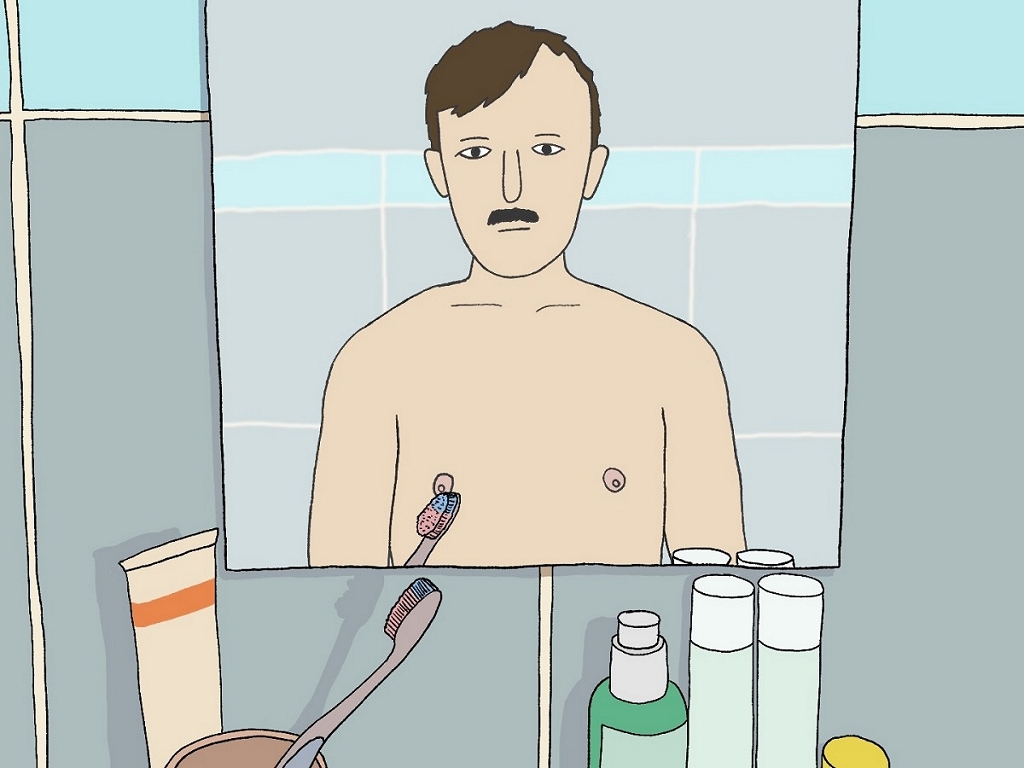The debate that got out of hand shows how clamp universities are between Pro-Palestina students and Israel
:format(webp)/s3/static.nrc.nl/wp-content/uploads/2024/05/10162722/web-1105ZATbijStudentenIntro.jpg)
Alexandra van Huffelen, chairman of the board, had tried it that way. At the entrance of the Nijmegen lecture hall where they would be debated about the tires of Radboud University with Israel, she was ready on Monday to welcome students with a chat and a handshake. They had to leave their protest signs in the hall. This would be a discussion, not a protest.
But how do you discuss genocide? Once in the hall come from Huffelen and two other board members on a wall of distrust among the approximately 150 students and teachers. There is enough talk now, is the tenor. The advice of an internal committee to the board to suspend ties with two Israeli institutions is too late and too little, find students.
Within half an hour the sleek design of the meeting – speaking briefly, no more than five sentences, listening – listening in the face of the moderator. He urges two students’ within ten seconds’ a smuggling banner (‘Cut all ties with genocide‘) Roll up again. We do it with words in this meeting, he says. These are our words, they throw against.
Within half an hour the sleek design of the meeting in the face of the moderator will explode
The impasse that follows is the beginning of the end. Then do it for me, an older teacher asks the students with the banner. He wants to continue with the debate – but makes the mistake of addressing the students as girls, or girls. Boegoep sounds – the end is now in sight.
After the moderator has hammered, murmur and a short consultation choir (« Radboud shame, blood on your hands ») follow. The meeting, intended to get ‘input’ from students and employees, results in mutual annoyance and frustration. And then this was not too bad, says a security guard. Last time people lay down on the floor.
Turbulent
Radboud University is one of the universities that have been struggling for more than a year with the consequences of the Gaza war for their moral attitude and functioning. Students and activists, including many internationals, demand that all ties with Israel are broken. Universities who don’t do that are « complicit in genocide. » Reference is often made to the work of researchers such as the Israeli Maya Wind, which describes that universities in the country are closely linked to the army and thus to the repression of the Palestinians.
Last spring the protests reached a peak. University buildings were occupied in Amsterdam and evacuated by the mobile unit. A tent camp also arose in Nijmegen, protest marches were held and buildings were occupied. The fact that the university board in Amsterdam appealed to the police to put an end to the occupations, aroused great anger.
Initially, universities mainly responded defensively to turbulence. In an open letter, the rectors in June announced that he did not see anything in the ‘isolation’ of Israeli scientists. As long as an « open debate » was possible, they saw no reason to « reconsider or break » the collaboration. Breaking ties with an entire country was not an issue anyway. Universities would only do that if the central government dedicated, such as with Russia after the invasion of Ukraine.
Read also
From Mexico City to Ghent, from Sevilla to Melbourne: everywhere tents for Gaza and against ties with Israel
Genocide
That rejection did not last long. Under pressure from the protests, but also due to the escalation of the war and the indictment due to genocide Against Israel by the International Court of Appeal in The Hague, a few universities announced that it would still take a closer look at their collaboration with Israeli institutions. Commissions would test those tests against ethical guidelines and advise on possible steps.
Collaboration with institutions in ‘sensitive’ countries was already on the agenda in a different context, since the last-rutte cabinet, attention asked for ‘knowledge safety’ and the social safety of academics.
What did it deliver? The results are trickling in recent months and give a mixed picture. The University of Amsterdam announced the exchange with Hebrew University in Jerusalem – who actually already stillag because of the war – now ohok formally to stop. This happened on the advice of an ethical committee to prevent students from being involved in the violation of human rights. The Hebrew University also provides lectures for soldiers. After ‘mitigating’ measures, the exchange could be resumed.
Also Tilburg University, where last year it was extensively protested, received that advicethoroughly worked out by your own committee. The board did not take over the advice and said it first wanted to talk to the Israeli partners – to the anger of students and activists.
The board in Tilburg said it first wanted to talk to the Israeli partners – to the anger of demonstrating students
New insights has not yet yielded that in public. In an open letter, 263 students, teachers and alumni again demanded last week that the university breaks the ties with Israel. By Talmen, the university would make itself complicit in the « genocidal persecution of the Palestinian people ».
In Nijmegen, an advisory committee concluded that the ties with Hebrew University and the University of Tel Aviv had to be suspendedagain mainly because of their relationship with the army. Whether the board follows that advice should turn out to be in the coming weeks, for many of the students who came to the debate on Monday, the advice does not go far enough. They demand an immediate boycott, where the BDS movement (Boycot, Divestment, Sanctions) against Israel for commitment.
Internationalization
University administrators are now stuck among the requirements of Pro-Palestinian students and teachers-who draw support from international reports on genocide in Gaza-and their own desire to protect the university from political activism. The classical strategy of ‘repressive tolerance’, which worked for the student riot in the 1970s, does not seem resistant to the moral anger about the Gaza war. Anyone who wants to denounce genocide turned out to be at the non-debate in Nijmegen, cannot be apaized with even more ‘participation’. The internationalization of the university also plays a role: the world has entered the academy.
In the meantime, activist students can prepare for the next confrontation. The Cabinet has decided to set a fight against anti -Semitism, which should promote the safety of Jewish students on campus, but must also make proposals for ‘the exclusion of anti -Semitic speakers at colleges and universities’. American universities such as Harvard serve as an example, where task forces already advised on combating anti -Semitism on campus. This has led to stricter rules for protests at some universities.
The Dutch Task Force, led by former pastor, former CNV chairman and former King’s Commissioner in South Holland Jaap Smit, meets this month for the first time, according to a spokesperson. In the Task Force, representatives also have a seat of the Central Jewish Consultation, the NS (due to demonstrations in stations) and the police.
Suspicion
And Israel? The struggle of Dutch universities is followed there with suspicion. The Dutch Institute for Advanced Studies (NIAS) in Amsterdam, which announced that it would no longer want to collaborate with Israeli institutions, received a lawyer letter on behalf of the Israeli universities by turning post who threatened with legal steps for ‘discrimination’.
It has not yet come that far with the universities. The rector of Hebrew University, Tamir Sheeper, says that he objected by letter to the steps of the University of Amsterdam and the advice to the board of Radboud University.
In the meantime, Israel is following the struggle with suspicion and sometimes threatens with legal steps
Sheeper underlines in those letters that Hebrew University does teach to soldiers, but autonomously fills in its education and does not take into account the army or the Ministry of Defense. « That could have been clarified if we were asked, » he writes. Sheeper believes that admitting requirements for a boycott of his institution would amount to ‘yields for intimidation and discrimination’.
In Nijmegen a list of cardboard protest signs will remain in the hall on Monday. Against genocide, against ties with Israel and against the ‘cowards’ of the board.
Read also
A jam of action groups and ‘toolkits’ from the US: This is how the student protest was created in Amsterdam

:format(webp)/s3/static.nrc.nl/wp-content/uploads/2024/05/24161110/data116086988-0375e0.jpg)
:format(webp)/s3/static.nrc.nl/images/gn4/stripped/data133314127-765aec.jpg)
:format(jpeg):fill(f8f8f8,true)/s3/static.nrc.nl/wp-content/uploads/2019/10/youp5bij3.png)
/s3/static.nrc.nl/images/gn4/stripped/data133306951-418567.jpg|https://images.nrc.nl/Aqhex4vuXDkTG2ibAuxQ999h3pQ=/1920x/filters:no_upscale()/s3/static.nrc.nl/images/gn4/stripped/data133306951-418567.jpg|https://images.nrc.nl/IUxmNDWQ6SsEQ92WXa797HqINn0=/5760x/filters:no_upscale()/s3/static.nrc.nl/images/gn4/stripped/data133306951-418567.jpg)




